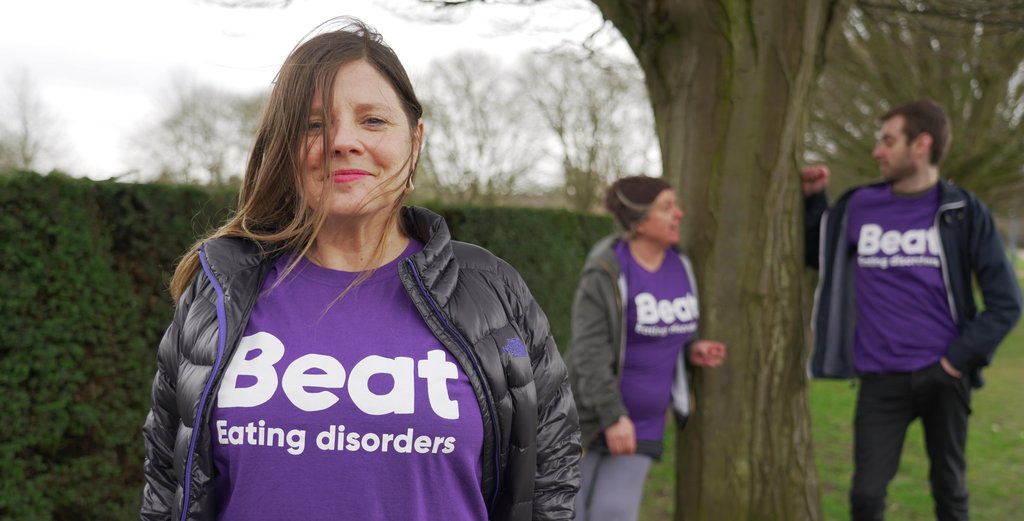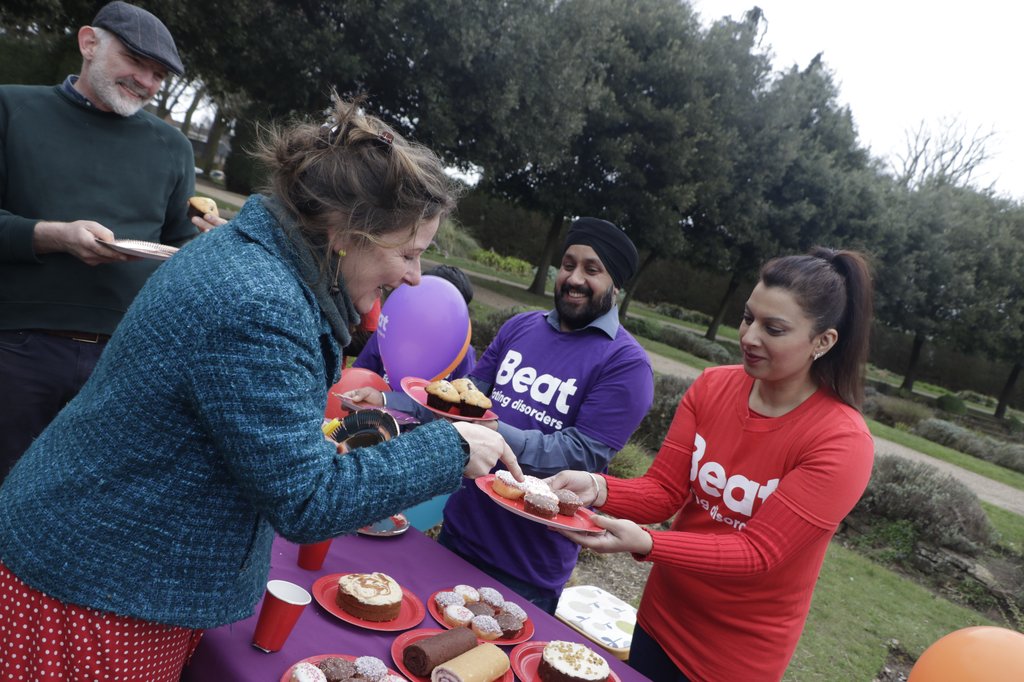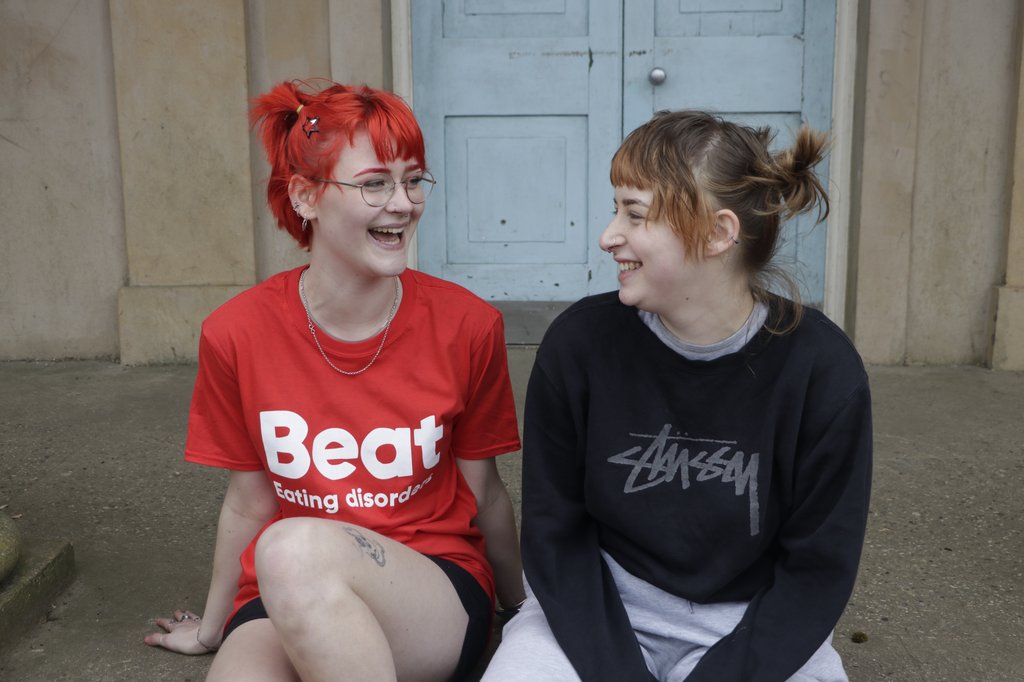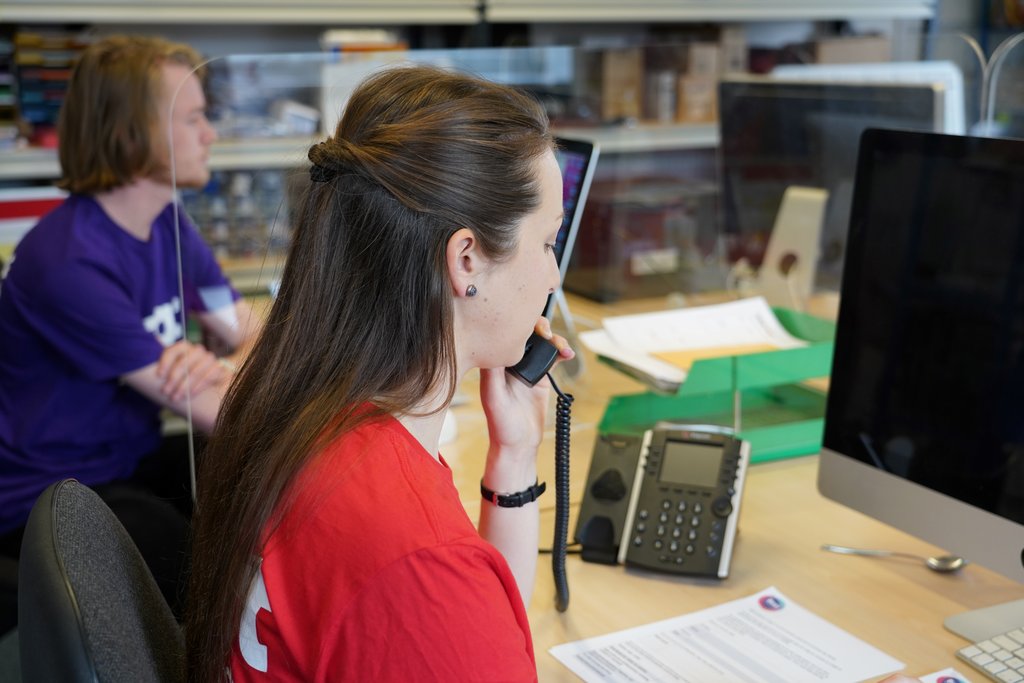Join the team
Looking for rewarding work?
A four-day working week?
Great benefits and flexible working?
A team doing amazing things, helping to change lives?
Read on!
As the UK’s eating disorder charity, Beat exists to end the pain and suffering of eating disorders. That work takes a team of passionate, dedicated people who want to make a difference to the lives of people affected.
We are committed to change
Our cause touches people of every background. LGBTQ+ people. Disabled people. People of every age, ethnicity, gender, and class. We are committed to recruiting, retaining, and promoting a diverse mix of individuals who are representative of the communities we serve.
And we’d love to have you be a part of it.

Our work takes compassionate, caring Helpline staff. It takes dedicated, enthusiastic fundraisers. It takes bold, brilliant campaigners. It takes thoughtful, creative marketers. When you join us, however you join us, you’ll bring your passion to a fast-growing team that truly wants to make the world better for the people we support.
We know a good workplace is one that is open and caring, valuing respectful discussion and ensuring everyone is safe to be themselves. Collaboration, accountability and empowerment are written in our values, and we’ve recently worked with inclusivity consultants the Equality Academy to better understand our culture and learn where we can make positive changes.
Beat really is a place like no other organisation I have worked at before. The team are remarkable, we have some fantastic leaders and whilst we work remotely there is a great sense of community across Beat. The company culture is incredibly positive; we work within an environment where managers truly do care about their teams, whilst equally offering them challenges and the opportunity to grow.

Employee benefits

Four-day working week
Full-time employees work 34 hours across four days

Working from home
Flexible working allows working from home in many roles

Generous annual leave
Annual leave (in addition to bank holidays) starting at 5.2 weeks, rising to 6 weeks

Faith-based celebrations
Christian bank holidays can be swapped for other faith-based celebrations

Pension
Pension scheme with 5% matched contribution

BUPA membership
Free membership offers money towards healthcare costs, including optician, dental, physiotherapy and counselling

Learning & Development
At least 10% of time to be used for learning and development

Study/volunteering leave
Additional day per year to take as study or volunteering leave

Tech savings
Latest tech available through Techscheme - save and spread costs

Spread travel costs
Interest-free season ticket loans help spread annual travel costs

Bike for work
Buy a new bike for work through Cyclescheme
I was so impressed with Beat as an organisation, right from my first interview! There was a relaxed and personal feel to the process that really made me feel like they whoever they appointed would be joining a very warm and welcoming team. I wanted to be that person!

Here are some of our 2023-24 Beat highlights
In total, we helped the people who needed us most 70,396 times through our support services
Our campaign to shine a light on ARFID resulted in over 10,000 video views online and 800 attendees at our ARFID Workshop
Beat appeared 3,500 times in the media, increasing awareness of eating disorders and available support
Through our campaigning we continued to raise awareness of eating disorders within the Govt’s of all four nations
We supported 4,437 carers through our workshops and online plattform, welcomed 472 delegates at our Frontline Conference and provided over 2,000 support sessions for carers
Our online training for School Professionals supported 5,814 professionals in primary, secondary and 6th Form education
We launched Community of Practice sessions for nursing, GP, or primary care staff who have completed the relevant training, offering a safe, supportive, and dedicated virtual space to meet and consider eating disorders
To read more about our recent impact and achievements, check out our 2023-24 Impact Report

From the minute I arrived at the Recruitment Day, I knew I had to find a way to work for Beat; I was blown away by how kind, compassionate, welcoming and inspiring everyone was! And I’m overjoyed to say that this has remained the case – an incredible bunch of people achieving incredible things. Super proud to be a part of it!
A charity that cares..
Staff wellbeing is very important to us
Great training
Staff training around topics such as wellbeing, mental health, resilience and handling stress
Long weekends
Most full-time staff work Monday to Thursday, enjoying a three-day weekend
Flexibility
There's considerable flexibility over working hours, as long as necessary diary requirements or required shifts can be met
Share ideas
Suggestions and feedback from all staff are shared and discussed at meetings of the Staff Forum
Build relationships
Opportunities to meet and connect with colleagues across the organisation
Peer connection
Self-organised Affinity Groups, peer connection spaces across directorates for staff identifying as a minority group, e.g. LGBTQ+ staff
Support
Regular supervision, one-to-ones and general catch-ups with line manager
Breaks
You can take a break when needed. Have a cup of tea. Do some stretches
Keep in touch
Regular contact with colleagues for those working from home through Teams. GIFs are encouraged
And we have lots of fun!
We have a book club and staff chat groups to share recommendations and photos of our pets and hobbies

Staff suggestions
Staff members are encouraged and given opportunities to share suggestions and input into the way we work and our overall strategy.
There are many different ways to give input. Staff surveys. Our anonymous staff suggestion box. Meetings across teams and departments. Working groups for topics such as equality, diversity and inclusion, or to develop new services, training or campaigns. Away days with strategy sessions. Everyone has a voice and can help us shape a better future together.

I've never worked anywhere where there is so much empathy
Learning and development
We highly value learning and development at Beat. The more we learn, the greater our knowledge and skills become. This positively impacts our work and achievements. It's one of the reasons why we have an excellent track record of internal progression.
It's so important that we ask our staff to dedicate 10% of their working week to their own learning and development.
There are many opportunities for staff training with input from external coaches and learning from different teams.

Candidate Toolkit
We’ve put together a guide about applying for roles at Beat, with some top tips and information about interviews.
Applications
Applying for a role
If you see a current vacancy you'd like to apply for, here's what you need to do:
- Go to the webpage for the role.
- Read the details, including the Job Description and Information for Candidates documents, to make sure it would be a good fit for you.
- Download the two application forms and fill them in. You'll need to refer to the Person Specification section of the Job Description when you complete the 'Suitability for the role' statement in the Part 2 form. It's your chance to show us how great you are! The more relevant information you give about your skills and experience, the better.
- Check your completed forms, making sure you've filled in all the required fields.
- Upload your two forms and submit on the webpage for the role. It's as easy as that!
Once you've sent your application, you should see a message to show you it's worked. If you don't see this, try submitting again.
We receive lots of applications so we're unable to give feedback at this stage. But we appreciate and value your effort and time in applying to work with us.
Equality, diversity and inclusion in recruitment
At Beat, we believe in the power of diversity, inclusion, and equal opportunity. We're dedicated to recruiting, retaining, and promoting a diverse group of individuals who truly represent the communities we serve. Our hiring managers have training in EDI (Equality, Diversity, and Inclusion) and recruitment to make sure of a fair process where everyone has an equal chance, regardless of their background.
We use blind recruitment in our application process. Any identifying information is kept hidden from our hiring managers, reducing any biases that may impact the selection process.
It's why there are two application forms. Part 1 collects identifying information, and details about your protected characteristics; these are used only for data monitoring, to help us see the diversity of our candidates and areas of underrepresentation. The hiring managers won't see that form. You'll only be assessed on your suitability for the role based on what you write in your Part 2 form.
We're committed to continuously improving equality and fairness in our recruitment processes and across all areas of what we do. By doing so, we aim to create an inclusive environment where everyone feels valued and has equal opportunities to succeed.
References
We ask for your referee details in the Part 1 application form. In most cases, referees are only contacted after a conditional job offer has been accepted. If there's a need to reach out to a referee sooner, we'll discuss it with you first.
Reasonable adjustments
If you need any reasonable adjustments during the application stage, please let us know. We're here to talk and to accommodate your needs. Your request will be forwarded to the hiring manager, who'll arrange the most suitable and fair adjustment.
Top tips
Stand out
When it comes to showcasing why you'd be an exceptional candidate, take the time to think carefully and choose the best examples that highlight your skills and strengths. This is your chance to shine!
Give enough detail
The hiring manager will be looking closely at the contents of your application to determine who moves forward in the selection process. Give specific information about your experiences, achievements, and how they relate to the role you're applying for. Strike a sensible balance - while a ten-word application wouldn't do justice to your potential, a ten-page application would be a bit much! Find that sweet spot where you give enough to impress while keeping it concise and focused.
Check before submitting
Before hitting that submit button, take a moment to go through both forms with a keen eye. Double-check everything has been completed accurately and to your satisfaction. This is your chance to make sure your application truly reflects your best self. And don't forget to tick and date any declarations so we're able to accept your application.
Don't leave it until the last minute
Your application matters and every detail counts so take plenty of time to give it your best effort. This way, you'll be able to do justice to your unique qualities and experiences.
We're rooting for you and can't wait to see what you bring to the table! Good luck!
Interviews
Interview types
The Information for Candidates document for each role includes the date and location for interviews, so you can check this when you apply. For some roles the interviews will be held online.
All roles have both a competency-based interview and a resilience and wellbeing interview.
For some roles, there will also be a reverse interview, where you'll be expected to ask questions to a panel, who are members of Beat's staff or volunteer teams. Information about the panel would be given in advance.
When invited to interview, we'll make sure you know the details.
Preparing for the interview
We understand that the interview process can be challenging for any candidate – possibly because they have not attended an interview for a long time, possibly not an online interview or possibly due to a disability, they find interviews particularly hard. Beat is always willing to make reasonable adjustments when appropriate to give all candidates the best opportunity to show their skills and experience, this is why Beat is publishing some guidance and example interview questions for anyone to access.
If you are invited to interview, you may be asked to give a short presentation or undertake a task related to the role. All the information you need will be provided to you. We will then hold the interview meeting, usually with two interviewers, sometimes more, we will provide their names on your interview invitation.
To prepare for your interview, read through the person specification within the Candidate Pack, you are most likely to be asked questions that relate to the experience, competencies and knowledge required by the role.
Below are some examples of general questions that we may ask, we will most likely ask you competency based questions to show your previous experience of different situations and to learn about your skills, we will ask about role specific examples where the role requires some prior knowledge and some questions to understand how you would fit within Beat. When answering the questions you can use examples from either previous work or from outside of the workplace.
You would not be asked all the example questions below and will additionally be asked others to demonstrate your suitability for the role, as well as follow-up questions to clarify information.
If you have any particular concerns or interview requirements, please contact talent@beateatingdisorders.org.uk
General Beat example questions:
What attracts you to this role - What do you think you can achieve at/offer Beat?
What do you understand about equality, diversity and inclusion in the workplace?
Could you give us an example of how you ensured that your own behaviour contributed to an inclusive culture within the workplace?
How do your personal values fit with Beat’s values?
Other example questions from different roles:
Can you tell us about a time where you have had to juggle workstreams and reprioritise tasks?
Can you give an example of giving feedback to a colleague or volunteer?
Tell us about a time you have proactively identified a Safeguarding Risk and the actions you took?
What is your understanding of confidentiality? Give an example of how and why it may be broken.
Can you describe your personal management style?
Tell me about a situation when you have come up with a good solution to a problem you’ve faced.
Tell me about a time when something happened that you didn’t anticipate, and you had to adapt to new conditions or circumstances
Resilience and wellbeing interviews
So, what's a resilience and wellbeing interview?
Good question! Thanks for asking.
As our work involves supporting vulnerable people who may be in distress, all staff are likely to sometimes come across some potentially upsetting content. This can be difficult for staff at times and for some it can potentially have a negative impact on their health and wellbeing.
To best protect our team, and to make sure all staff are able to thrive at Beat, we conduct a resilience and wellbeing interview as part of the recruitment process. This helps to make sure that applicants understand the pressures of the role and are able to meet them, and that we're aware of the support they may need from Beat to do so.
These interviews are very conversational, guided by some simple questions, and they offer a safe space for candidates to share about their experiences and approach to their own wellbeing.
It's separate from the formal interview with the hiring manager and is conducted by two interviewers who are trained to facilitate an environment where candidates can be at ease, supported and understood. This is an outworking of our commitment to caring for our employees and their wellbeing.
Reasonable adjustments
If you need any reasonable adjustments during the interview stage, please let us know. We're here to talk and to accommodate your needs. Your request will be forwarded to the hiring manager, who'll arrange the most suitable and fair adjustment.
After interviews
If you're interviewed for a role, the hiring managers will contact you after interview to let you know the outcome.
This would usually be a phone call, but please let the hiring manager know in your interview if you'd prefer to be contacted a different way.
If you're successful, we'll send you your conditional offer letter after you've verbally accepted the role, when we'll also get in touch with your referees and do a right to work check (and, if required for the role, a DBS check).
If you're interviewed but sadly unsuccessful, you can ask for feedback.
Remember, we also have other opportunities for you to consider. Whether it’s volunteering or fundraising, there are always ways to get involved!